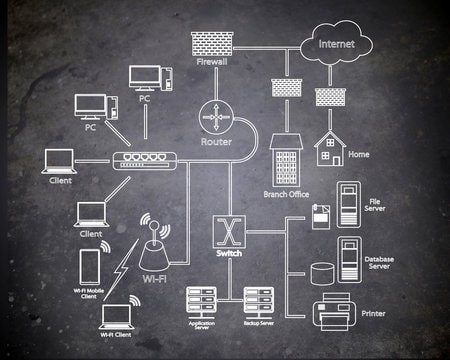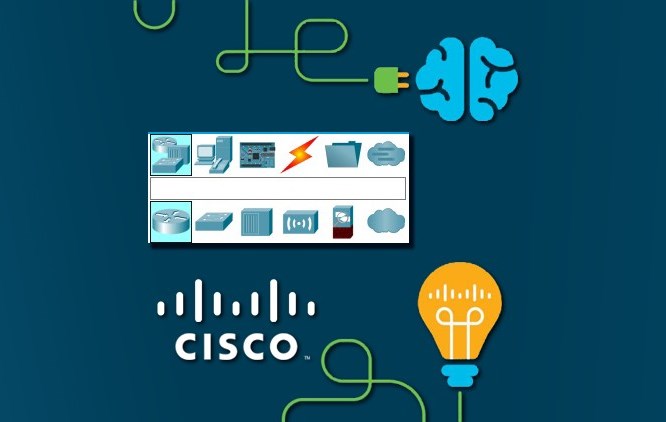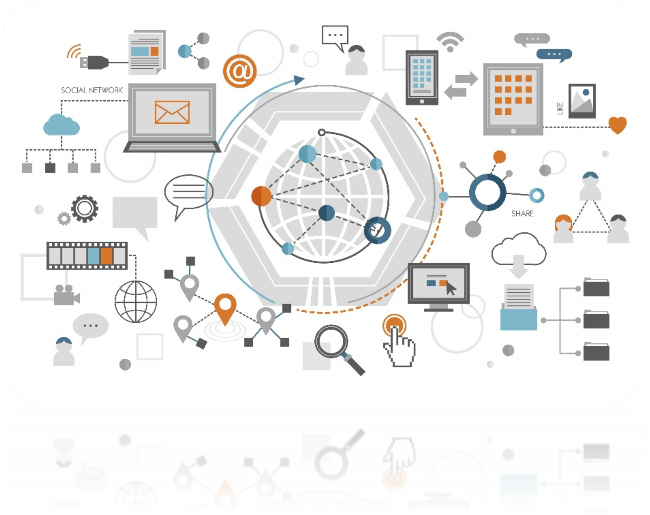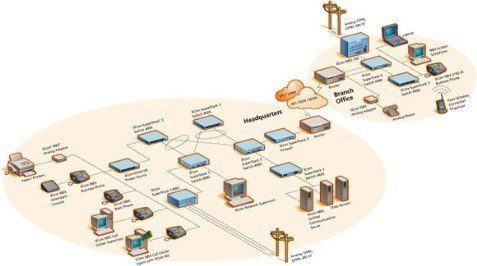Network Structure and Its Importance in Organizations
Network structure refers to a collection of procedures, standards, protocols, and tools used to create, implement, and maintain a communication network. A network is essentially a system that allows devices to communicate with each other and with other networks, achieved through various means such as cables, optical fibers, or radio waves. In the modern world, the role of networks goes beyond being a tool for connecting two devices or locations. Networks now underpin many business activities, entertainment, and even our everyday affairs. They provide facilities that were previously incredibly complex or impossible, including access to the internet, video conferencing, online gaming, and cloud computing. Proper and standardized network structure design is essential to ensure optimal network performance, minimize errors and disruptions, and guarantee data and information security. In the age of modern communications, no aspect of network structure can be overlooked, as any fault or deficiency can have serious implications for network-based activities and services.
How Proper Network Design Can Enhance Efficiency and Security?
Efficiency: A well-designed network can transmit data at high speeds and without delays. This is critical for applications like video conferencing, online gaming, or any real-time responsive program. Additionally, aspects such as load balancing, reduced latency, and optimized routing can significantly impact network efficiency.
Security: Network security should be considered from multiple perspectives. Proper network structure design can prevent unauthorized intrusion, protect vital resources, and ensure the secure transmission of data. Measures such as firewalls, intrusion prevention systems, and proper encryption are among the security measures implemented through effective network design.
Stability: Networks that are well-designed are less susceptible to disruption, failures, or errors. Network stability means reduced downtime, increased uninterrupted operation, and higher user satisfaction.

The Principles Used by Tenetup for Network Design
In the complex and ever-evolving world of information technology, Tenetup takes a unique approach to issues. This approach is essentially a combination of the company's work philosophy and the engineering principles developed over the years.
- User-Centricity: Tenetup believes that every network design should be done with consideration for the needs and expectations of users. This means that the network structure should not only be efficient but also responsive to human needs.
- Security at Every Stage: From the beginning of the design process to its end, Tenetup considers security as a fundamental principle. The company designs with the best practices and standards available to ensure both data security and user safety.
- Future-Oriented Design: Tenetup understands that technologies change rapidly. Therefore, in network design, it acts in a way that structures are capable of upgrades and changes to remain in sync with future developments.
- Interaction and Collaboration with Customers: Tenetup believes that network design should not be solely the work of company engineers. Instead, customer feedback and opinions should also be taken into account in this process.
- Utilization of New Technologies: Tenetup is always in search of innovative technologies to design more advanced and superior networks using them.

Software and Technologies for Network Design
Effective network design requires the use of appropriate tools and technologies. At Tenetup, we ensure that networks are designed with the highest standards and efficiency by utilizing the latest tools and technologies:
- Network Design and Simulation Software: Such as Cisco Packet Tracer or GNS3, which allow designers to simulate and test networks before physical implementation.
- Network Management and Monitoring Software: Like SolarWinds or Nagios, which enable network administrators to continuously monitor network performance, accessibility, and security.
- Data Center Design Platforms: Such as VMware vSphere or Microsoft Hyper-V, which allow the efficient design of virtual and physical data centers with high efficiency and security.
- Security Tools: Such as Cisco ASA Firewall, Fortinet FortiGate, or Palo Alto Networks Firewall, which help enhance network security through features like filtering, IDS/IPS, and threat management.
- Storage and Data Recovery Technologies: Such as SAN or NAS systems that enable effective data storage and retrieval management.
- Wireless Technologies: Including Wi-Fi 6, MIMO, and Beamforming, which help design wireless networks with improved speed and coverage.
By using these tools and technologies, we are capable of designing and implementing stable, secure, and high-quality networks that meet the present and future needs of our clients.
Advantages of Choosing Tenetup
Selecting the right company for network design and implementation is of paramount importance, and Tenetup has become one of the best choices for this purpose, thanks to its unique features and strengths:
- Experience and Expertise: Tenetup leverages a professional and expert team with years of experience in designing, implementing, and maintaining various networks.
- Customer-Centric Approach: The company provides custom solutions tailored to the needs, expectations, and budget of its customers, ensuring that each client receives the best services.
- Utilizing the Latest Technologies: Tenetup always stays up-to-date with the latest network technologies and standards, incorporating them into its projects.
- Unlimited Support: 24/7 post-sales services and support are among the features that Tenetup proudly offers, ensuring that whenever you need assistance, the Tenetup professional team is by your side.
- Training and Guidance: Tenetup not only designs and implements your network but also provides training to your team, allowing you to operate your network more efficiently.
- High Quality, Cost-Efficiency: Given the increased efficiency and reduced issues stemming from network errors, Tenetup is a cost-effective and intelligent investment.
With these advantages, choosing Tenetup for network structure design and implementation is a confident step towards achieving the needs and goals of your business.

Engineering Principles in Infrastructure
Regardless of network size and requirements, a successful implementation of network design requires adherence to engineering principles in infrastructure. Some key aspects of these principles are outlined below:
-
Hierarchy: Hierarchy in design helps ensure a secure network and makes complex design issues more manageable and easier to oversee.
-
Modularity: Modular design ensures that different components within the network function as modules, simplifying the overall design. Cisco introduces several modules, including Data Center, Internet Edge, Service Block, and Campus sections.
-
Resiliency: A network should continue to function under normal and abnormal conditions. While normal traffic follows expected patterns, abnormal conditions can arise from hardware or software issues, increased traffic, or attacks like DoS.
-
Flexibility: A well-designed network should have the capacity to accommodate changes, such as adding a new service or increasing network capacity, with minimal disruption to operations and service delivery.
Modern networks are typically designed in multiple layers, with each layer having its own characteristics and functions. Layered design offers various benefits, as each device in each layer has specific tasks and functions. This flexibility and adaptability allow for easy modification, addition, or replacement of network components. This scalability and compatibility make this model highly versatile and expandable. Additionally, various service modules can be utilized in different layers as needed, offering capabilities like security enhancements, load balancing, and more.
Tenetup, with its global technology expertise and years of valuable experience in consulting, designing, deployment, operation, and monitoring of various computer networks, is prepared to provide technical and engineering services that align with global standards, in harmony with organizations' strategic plans and requirements.

Tenetup Company Services (Network and Security)
- Consultation, design, installation, setup, support, and management of local and inter-building wireless networks (Wireless Networks).
- Consultation, design, installation, setup, support, and management of LAN networks.
- Consultation, design, installation, setup, support, and management of Host and Network-based IDS/IPS systems.
- Consultation, design, installation, setup, support, and management of WAN networks.
- Consultation and design of network infrastructure based on fiber technology.
- Consultation, design, installation, setup, support, and management of Converged networks.
In today's digital world, the success of any organization often relies on the effective design and implementation of its network infrastructure. A well-designed network can lead to increased efficiency, security, and stability in daily operations. In this regard, choosing the right company for this task requires special attention and care. Tenetup, with its expert team, the use of cutting-edge technologies, and a customer-centric approach, is a suitable and reliable option to accompany you on this journey. By choosing Tent Up, you not only gain access to the best solutions but also have a trustworthy partner by your side.
If you are looking for professional consultation in network design or specific Tenetup services, you can contact us at 09012168807.
With Tenetup, what you envision for your future starts today!


